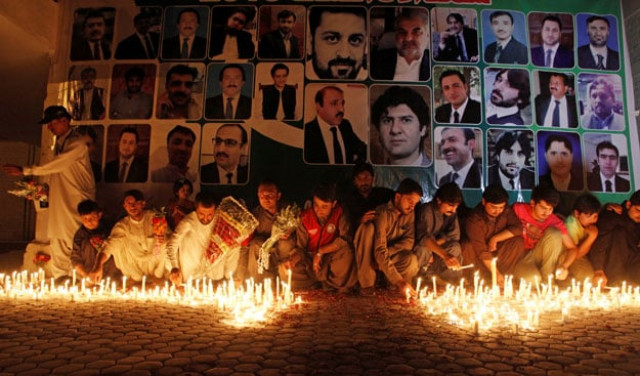Quetta tragedy: three days later
By the time these words are read most of the bodies from the Quetta attack will have been buried

Residents light candles for lawyers killed during the Monday blast at Civil Hospital during a candle light vigil in Quetta, August 9, 2016. PHOTO: REUTERS
The operation was meticulously planned and executed. The leader of the Balochistan Bar Association, a distinguished and highly respected lawyer, was assassinated in the morning. His body was taken to Quetta’s Civil Hospital and as expected his colleagues gathered en-masse. Security was poor to non-existent and all the bomber had to do was mingle with the throng and in an instant Balochistan lost an entire generation of lawyers. It could take decades for the legal profession to recover and it is going to be crippled for many years to come. From the perspective of the terrorist, this was a very successful operation — maximum impact for minimal expenditure of resources. For the administration and the security apparatus, it was little short of a disaster, the kind of defeat that they hoped was becoming a thing of the past.
Three days later and the federal government in the form of the prime minister is attempting to bring order to chaos by saying that his government has “finally decided to ensure seamless coordination among security agencies”. Finally? It will be recalled that the National Action Plan (NAP) was formulated in the aftermath of the Peshawar school massacre and among the 20 original points for action were that the National Counter Terrorism Authority (Nacta) would henceforward be the lead agency in the battle against terror — and it has not happened.
The Nacta remains essentially non-functional and unempowered, its budget cut by around 50 per cent this fiscal year. Among the many reasons why it has never got off the ground is that there are powerful vested interests that are keen to protect their turf and have zero desire to cede power and the formulation of policy and strategy to an overarching agency. Laudable as the prime minister’s desire to bring coordination and homogeneity to countering terrorism is, his chances of ever getting a level playing field are remote. ‘Seamless coordination’ is on nobody’s agenda but his own.
It is an uncomfortable — and universal — reality that terrorism adapts far faster than those fighting it at a state and institutional level. There is a diversity of terrorist organisations in Pakistan, all lean and mean, that are able to morph themselves to suit the environment. Thus the successes of Operation Zarb-e-Azb — and they must not be underestimated — prompt those it was targeting to create a work-around; a shift in targeting priorities being one option as the Quetta atrocity possibly demonstrates.
The complete failure of the government to get to grips with Islamic State entryism in Pakistan is a case in point. The government is still largely in denial, having failed to understand at any level the paradigm shift in how terror is envisioned, actualised and delivered by an organisation that in two years has re-written the terror playbook globally. The interior minister is now on record as saying that the terrorists are choosing softer targets out of “desperation”. Not so. The terrorists are not in the least desperate, they just outflanked every agency and organisation sent to counter them. There will be other Quettas unless the anti-terror dots get joined up. Your move, gentlemen.
Published in The Express Tribune, August 11th, 2016.
Like Opinion & Editorial on Facebook, follow @ETOpEd on Twitter to receive all updates on all our daily pieces.














COMMENTS
Comments are moderated and generally will be posted if they are on-topic and not abusive.
For more information, please see our Comments FAQ